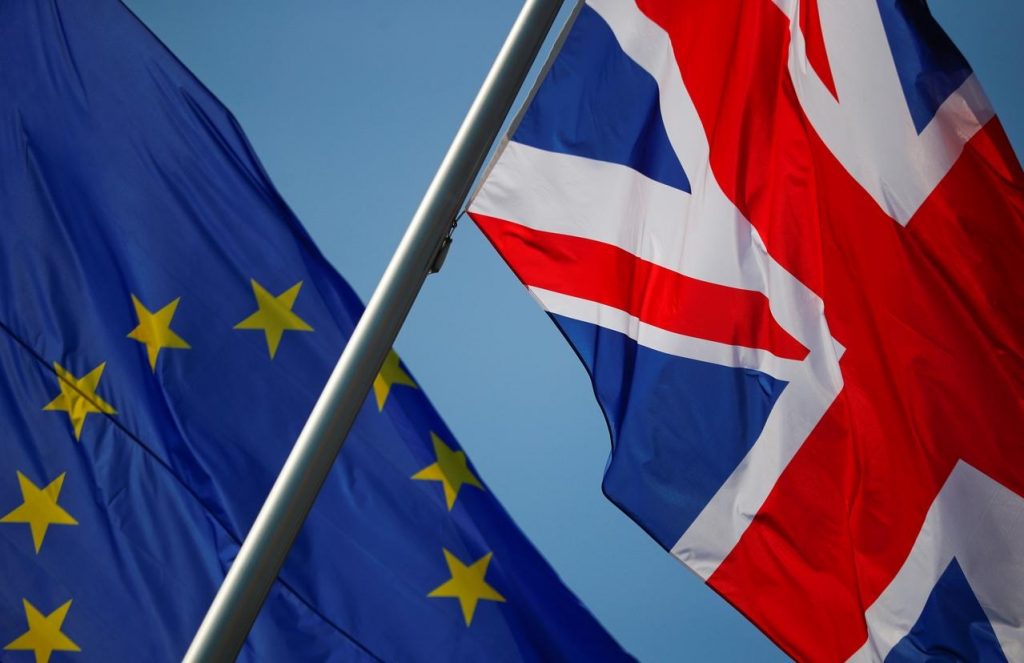Britain went into Tuesday’s fresh round of Brexit trade talks with a warning to the European Union that it was ramping up preparations to leave without an agreement as both sides bickered over rules governing nearly $1 trillion in commerce.
Britain left the EU on Jan. 31 but talks on new trade terms have made little headway as the clock ticks down to an October deadline for a new deal and then the end of the status-quo transition arrangement in late December.
As diplomats try to gauge whether Prime Minister Boris Johnson is blustering or serious about allowing a tumultuous finale to the four-year Brexit saga, his chief negotiator said yet again that Britain was not afraid of a no-deal exit.
That prospect scares business and weakened the British pound on currency markets.
“We have now been talking for six months and can no longer afford to go over well-trodden ground. We need to see more realism from the EU about our status as an independent country,” David Frost, Britain’s top Brexit negotiator, said in a statement.
“If they can’t do that in the very limited time we have left then we will be trading on terms like those the EU has with Australia, and we are ramping up our preparations for the end of the year.”
The EU warned Britain on Monday that its international reputation as a pillar of the West would be tarnished and that there would be no trade deal after the Financial Times reported that London might simply undercut the Withdrawal Agreement treaty signed in January.
Britain said it was committed to the treaty but that it needed minor clarifications and a backup plan to support the 1998 Northern Ireland peace deal.
European diplomats said Britain was playing a game of Brexit chicken by threatening to collapse the process and challenging Brussels to compromise first. Some fear Johnson may view a no-deal exit as useful distraction from the coronavirus crisis.
IRELAND WORRIED
Irish Prime Minister Micheal Martin said Britain’s trade talks with the EU would be pointless if the Brexit withdrawal agreement it signed up to is not implemented in full,
“The withdrawal agreement is an international treaty and we expect the UK government to implement and to adhere to what was agreed. We trust them to do so or they would render the talks process null and void,” Martin told the Irish Examiner.
The latest round of negotiations in London are likely to be tough: Britain says the EU has failed to understand that it is now an independent country – especially when it comes to fishing and state aid.
The EU, weary of wrangling over Brexit, says it needs specifics from London and that Britain cannot make its own rules and have preferential access to its markets.
As Johnson says mid-October is the deadline for a deal, diplomats said the public posturing was to be expected.
“As you get closer to the deadline, it’s not surprising people ramp up the pressure,” one EU diplomat said. “We all believe there has been movement by the EU towards the UK position, but it hasn’t been reciprocated, and that’s the concern.
“So, time is running out. If we are to get the deal that everybody wants, given the number of open issues and given the amount of time left, any deal is looking thinner and thinner.”
Without agreement, trade and financial ties between the world’s sixth-largest economy and its biggest trading bloc would be thrown into disarray, spreading havoc among markets and businesses.
Brexit nerves boosted sterling-dollar implied one-month volatility to 10% for the first time since mid-June.
“But… if they don’t show the degree of flexibility and realism that we want them to show… then we’ll leave with the kind of trading arrangements that Australia and other countries have and we think that’s also a good arrangement for the future.”
Australia is negotiating a free trade deal with the EU to improve its market access, but for now largely trades with the bloc on World Trade Organization terms.


